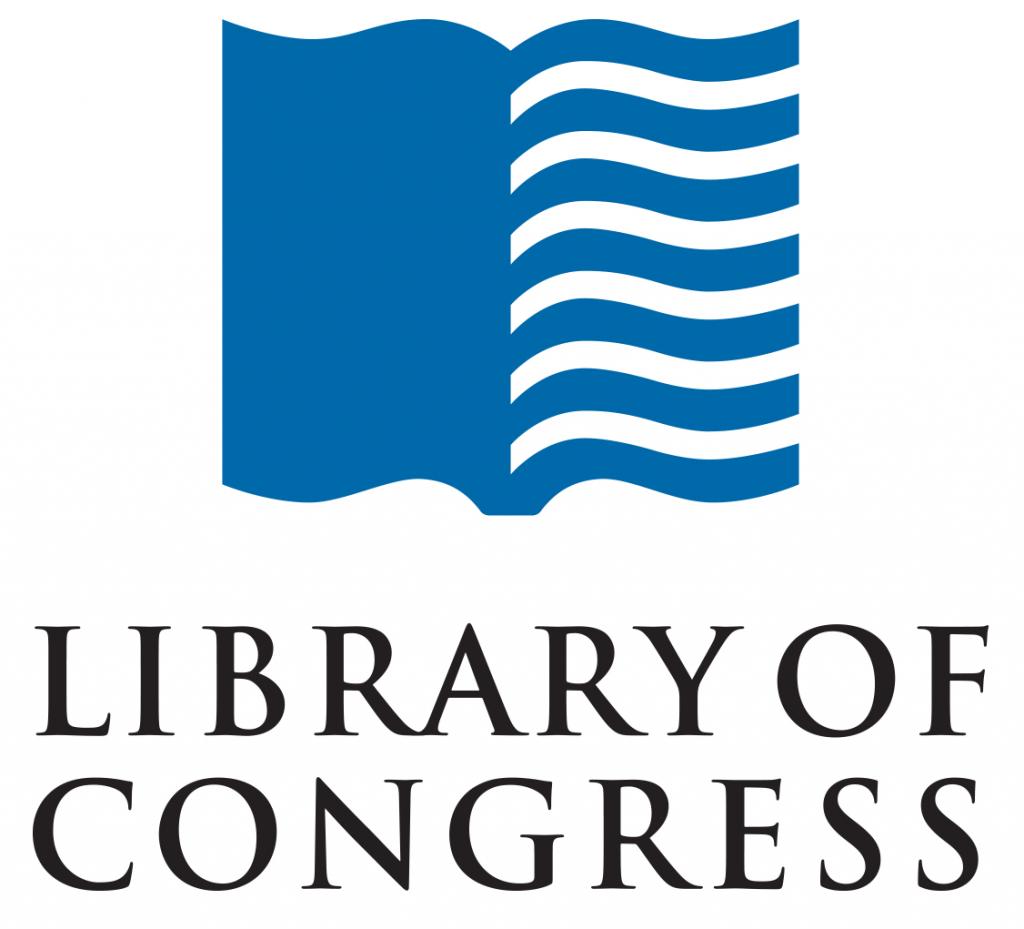from Jul. 1, 1865
Julia Ward Howe Poem
-
Full Title
Poetical Tribute to President Lincoln - Julia Ward Howe
-
Description
Philadelphia publishing house J.B. Lippincott & Co. compiled poetical tributes to President Lincoln in the months after his assassination. This piece, by Julia Ward Howe, talks about Lincoln's legacy and how to honor him and his contributions to the nation. Julia Ward Howe was an abolitionist, suffragette and author, most famous for writing "The Battle Hymn of the Republic," which is now one of the most famous songs of the Civil War. She was inspired to write the song after meeting with President Lincoln at the White House in November 1861.
-
Source
University of Wisconsin - Madison, Digitized by Google
-
Rights
This item is in the public domain and may be reproduced and used for any purpose, including research, teaching, private study, publication, broadcast or commercial use, with proper citation and attribution.
-
Tags
-
Cite this Item
Julia Ward Howe. "Poetical Tribute to President Lincoln - Julia Ward Howe". J.B. Lippincott & Co.. Remembering Lincoln. Web. Accessed May 5, 2025. https://rememberinglincoln.fords.org/node/1100
-
Creator
Julia Ward Howe
-
Publisher
J.B. Lippincott & Co.
-
Date
1865
from Jul. 1, 1865
Poetical Tribute to President Lincoln - Julia Ward Howe
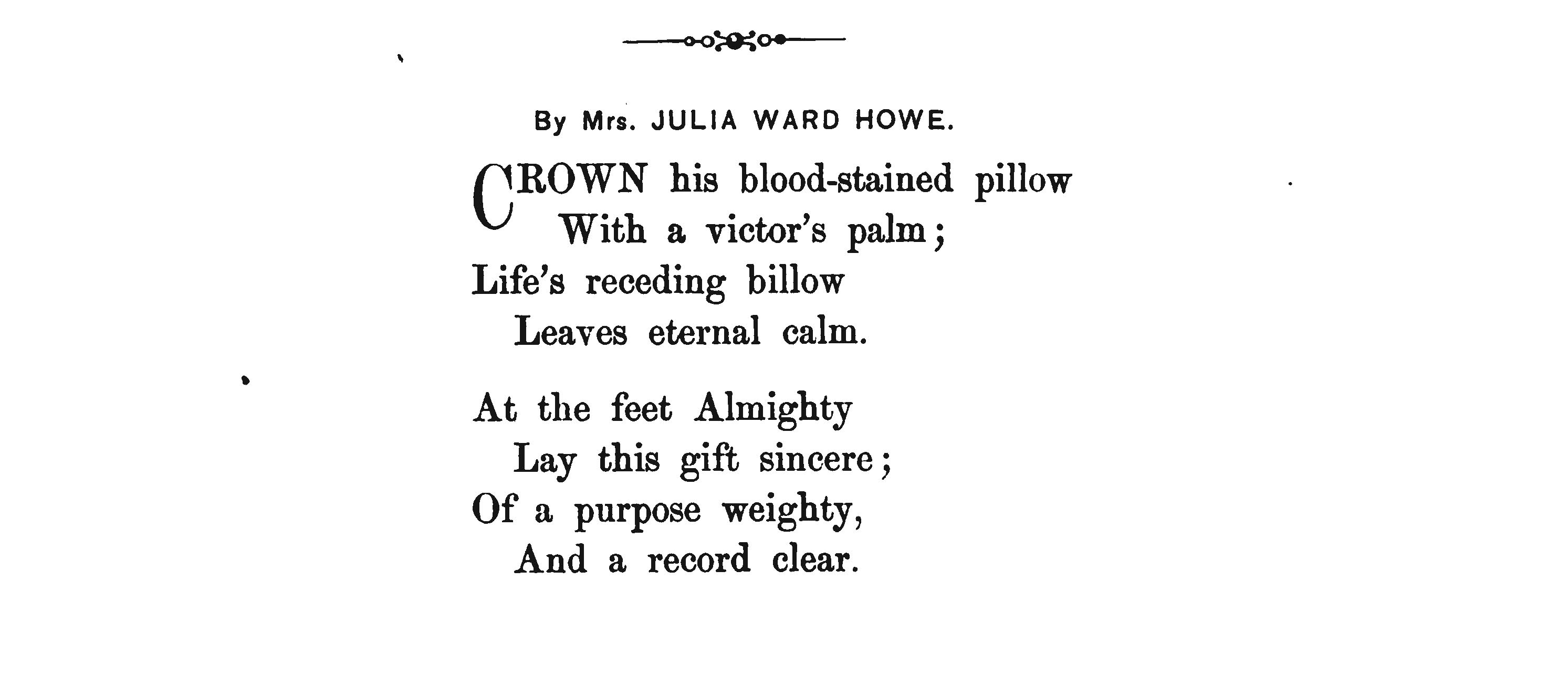
-
Description
Philadelphia publishing house J.B. Lippincott & Co. compiled poetical tributes to President Lincoln in the months after his assassination. This piece, by Julia Ward Howe, talks about Lincoln's legacy and how to honor him and his contributions to the nation. Julia Ward Howe was an abolitionist, suffragette and author, most famous for writing "The Battle Hymn of the Republic," which is now one of the most famous songs of the Civil War. She was inspired to write the song after meeting with President Lincoln at the White House in November 1861.
-
Source
University of Wisconsin - Madison, Digitized by Google
-
Rights
This item is in the public domain and may be reproduced and used for any purpose, including research, teaching, private study, publication, broadcast or commercial use, with proper citation and attribution.
-
Creator
Julia Ward Howe
-
Publisher
J.B. Lippincott & Co.
-
Date
July 1, 1865
from Jul. 1, 1865
William Cullen Bryant Poem
-
Full Title
Poetical Tribute to President Lincoln - William Cullen Bryant
-
Description
Philadelphia publishing house J.B. Lippincott & Co. compiled poetical tributes to President Lincoln in the months after his assassination. This piece, by Poet William Cullen Bryant, speaks of Lincoln's life and greatest accomplishment, freeing the slave. Bryant was considered a child-prodigy, publishing his first poem at age ten and his first book when he was thirteen. He later served as editor for the New York Evening Post. He was a member of the Republican Party and actually introduced Abraham Lincoln at Cooper Union in New York when Lincoln gave his famed "Cooper Union Speech" in 1860.
-
Source
University of Wisconsin - Madison, Digitized by Google
-
Rights
This item is in the public domain and may be reproduced and used for any purpose, including research, teaching, private study, publication, broadcast or commercial use, with proper citation and attribution.
-
Tags
-
Cite this Item
William Cullen Bryant. "Poetical Tribute to President Lincoln - William Cullen Bryant". J. B. Lippincott & Co.. Remembering Lincoln. Web. Accessed May 5, 2025. https://rememberinglincoln.fords.org/node/1099
-
Creator
William Cullen Bryant
-
Publisher
J. B. Lippincott & Co.
-
Date
1865
from Jul. 1, 1865
Poetical Tribute to President Lincoln - William Cullen Bryant
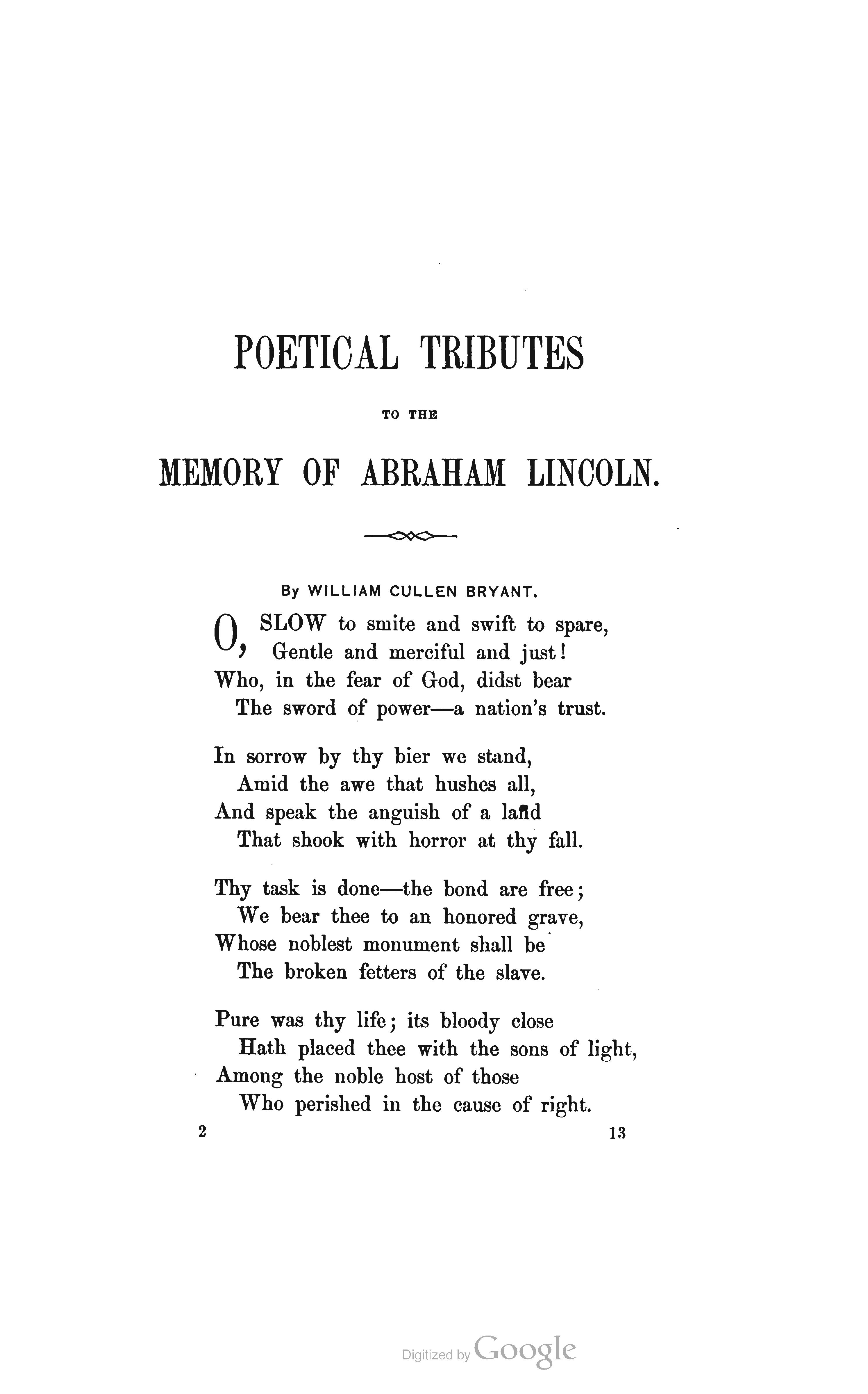
-
Description
Philadelphia publishing house J.B. Lippincott & Co. compiled poetical tributes to President Lincoln in the months after his assassination. This piece, by Poet William Cullen Bryant, speaks of Lincoln's life and greatest accomplishment, freeing the slave. Bryant was considered a child-prodigy, publishing his first poem at age ten and his first book when he was thirteen. He later served as editor for the New York Evening Post. He was a member of the Republican Party and actually introduced Abraham Lincoln at Cooper Union in New York when Lincoln gave his famed "Cooper Union Speech" in 1860.
-
Source
University of Wisconsin - Madison, Digitized by Google
-
Rights
This item is in the public domain and may be reproduced and used for any purpose, including research, teaching, private study, publication, broadcast or commercial use, with proper citation and attribution.
-
Creator
William Cullen Bryant
-
Publisher
J. B. Lippincott & Co.
-
Date
July 1, 1865
from Apr. 14, 1865
Diary of Orville Hickman Browning
-
Full Title
Diary of Orville Hickman Browning, Friend of Lincoln - Excerpts from April 14-19, 1865
-
Description
These are the diary entries of former U.S. Senator and friend of President Lincoln, Orville Hickman Browning, the day of Lincoln's assassination up to the funeral in Washington, DC on April 19, 1865. Browning discusses how he heard about the attacks and incorrectly states the Secretary of State Seward was killed. He talks about how Lincoln was the South's best ally within the government and speculates who the attacker was. Over the next few days he visits the White House and describes the body of the fallen president. These excerpts are part of the “Diary of Orville Hickman Browning Volume II: 1865-1881,” published in 1925 by the Illinois State Historical Library. Born in Kentucky in 1806, Browning moved to Quincy, Illinois to become a lawyer. Later he served as a U.S. Senator, adviser to Abraham Lincoln and Andrew Johnson, and even a cabinet minister. Browning and Lincoln became friends while serving in the state legislature; both were members of the Whig party. Browning served as an ally for Lincoln during his presidency.
-
Source
Hathi Trust Digital Library
-
Rights
The written permission of the copyright owners and/or other rights holders (such as publicity and/or privacy rights) is required for distribution, reproduction, or other use of protected items beyond that allowed by fair use or other statutory exemptions.
-
Tags
-
Cite this Item
Orville Hickman Browning. "Diary of Orville Hickman Browning, Friend of Lincoln - Excerpts from April 14-19, 1865". Illinois State Historical Library. Remembering Lincoln. Web. Accessed May 5, 2025. https://rememberinglincoln.fords.org/node/1098
-
Creator
Orville Hickman Browning
-
Publisher
Illinois State Historical Library
-
Date
April 14, 1865
-
Dimensions
22 cm.
from Apr. 14, 1865
Diary of Orville Hickman Browning, Friend of Lincoln - Excerpts from April 14-19, 1865
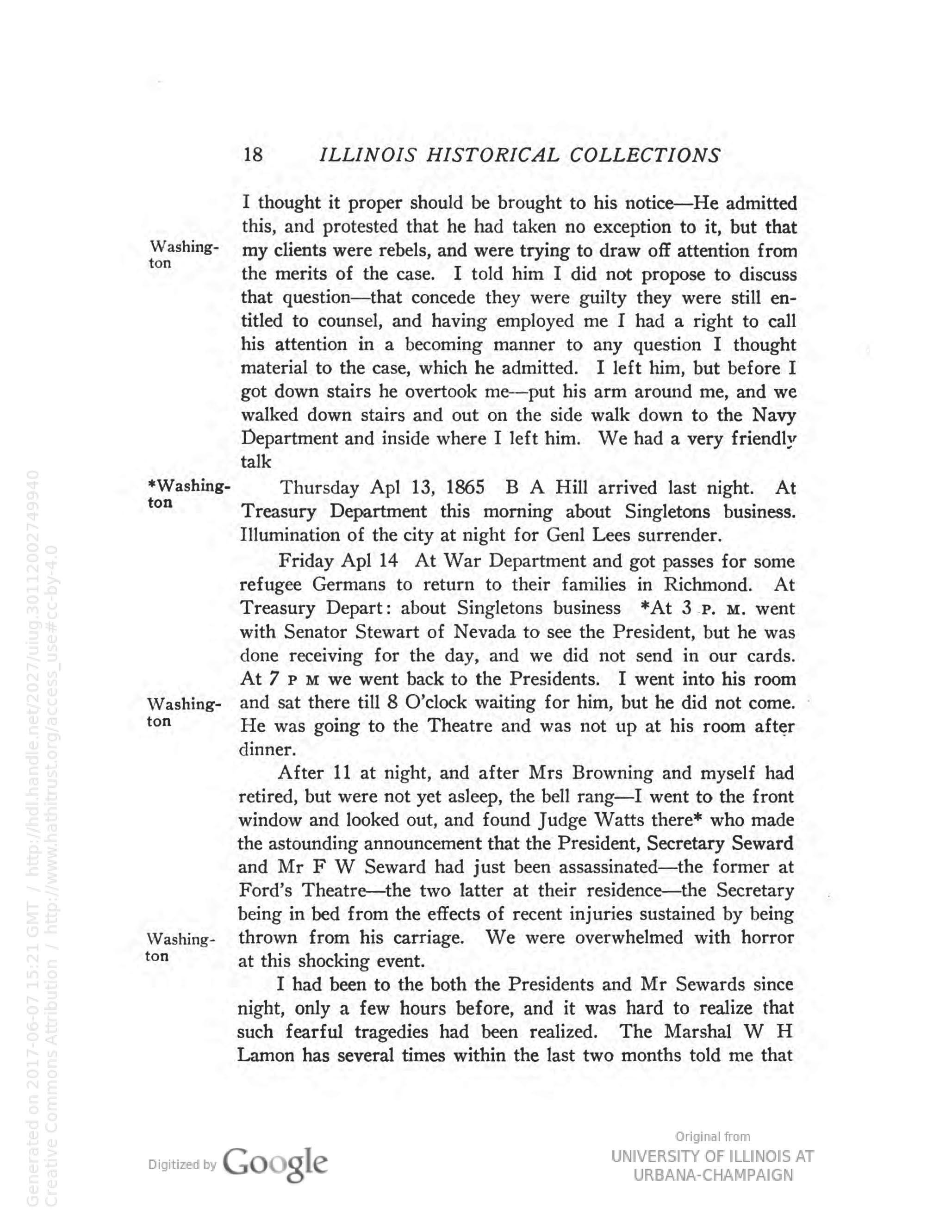
-
Description
These are the diary entries of former U.S. Senator and friend of President Lincoln, Orville Hickman Browning, the day of Lincoln's assassination up to the funeral in Washington, DC on April 19, 1865. Browning discusses how he heard about the attacks and incorrectly states the Secretary of State Seward was killed. He talks about how Lincoln was the South's best ally within the government and speculates who the attacker was. Over the next few days he visits the White House and describes the body of the fallen president. These excerpts are part of the “Diary of Orville Hickman Browning Volume II: 1865-1881,” published in 1925 by the Illinois State Historical Library. Born in Kentucky in 1806, Browning moved to Quincy, Illinois to become a lawyer. Later he served as a U.S. Senator, adviser to Abraham Lincoln and Andrew Johnson, and even a cabinet minister. Browning and Lincoln became friends while serving in the state legislature; both were members of the Whig party. Browning served as an ally for Lincoln during his presidency.
-
Source
Hathi Trust Digital Library
-
Rights
The written permission of the copyright owners and/or other rights holders (such as publicity and/or privacy rights) is required for distribution, reproduction, or other use of protected items beyond that allowed by fair use or other statutory exemptions.
-
Creator
Orville Hickman Browning
-
Publisher
Illinois State Historical Library
-
Date
April 14, 1865
-
Dimensions
22 cm.
from Apr. 20, 1865
Mayor's Proclamation on the Death of Abraham Lincoln - Brownville, Nebraska
-
Full Title
Brownville, Nebraska Territory Mayor's Proclamation on the Death of Abraham Lincoln
-
Description
The newly elected Mayor of Brownville, Nebraska Territory, Charles G. Dorsey, made a proclamation on the death of Abraham Lincoln, which was published in the Nebraska Advertiser the week after the President's death. The town of Brownville heard about Lincoln's death almost immediately. The city of Brownville was only about 10 years old at the time of Lincoln's assassination. The Nebraska Advertiser was founded in 1856 by a recent resident, Robert Wilkinson Furnas. Fumas was opposed to slavery and those views were often illustrated in the newspaper.
-
Source
-
Rights
This item is in the public domain and may be reproduced and used for any purpose, including research, teaching, private study, publication, broadcast or commercial use, with proper citation and attribution.
-
Tags
-
Cite this Item
Nebraska Advertiser. "Brownville, Nebraska Territory Mayor's Proclamation on the Death of Abraham Lincoln". Robert Wilkinson Furnas. Remembering Lincoln. Web. Accessed May 5, 2025. https://rememberinglincoln.fords.org/node/1097
-
Creator
Nebraska Advertiser
-
Publisher
Robert Wilkinson Furnas
-
Date
April 20, 1865
from Apr. 20, 1865
Brownville, Nebraska Territory Mayor's Proclamation on the Death of Abraham Lincoln

-
Description
The newly elected Mayor of Brownville, Nebraska Territory, Charles G. Dorsey, made a proclamation on the death of Abraham Lincoln, which was published in the Nebraska Advertiser the week after the President's death. The town of Brownville heard about Lincoln's death almost immediately. The city of Brownville was only about 10 years old at the time of Lincoln's assassination. The Nebraska Advertiser was founded in 1856 by a recent resident, Robert Wilkinson Furnas. Fumas was opposed to slavery and those views were often illustrated in the newspaper.
-
Source
-
Rights
This item is in the public domain and may be reproduced and used for any purpose, including research, teaching, private study, publication, broadcast or commercial use, with proper citation and attribution.
-
Creator
Nebraska Advertiser
-
Publisher
Robert Wilkinson Furnas
-
Date
April 20, 1865
from Apr. 20, 1865
Letter from William H. Kesler, 3rd Missouri Cavalry
-
Full Title
Letter from William H. Kesler, 3rd Missouri Cavalry, to his sister Rose Ann Kesler
-
Description
A letter from William H. Kesler to his sister Rose Ann Kesler in late April 1865. He writes to her about hearing of the assassination, his sorrow and anger toward the assassin. At the beginning of the Civil War, William H. Kesler resided in Champaign, Illinois but joined the Missouri volunteer units after the quota was reached in his home state. He served in the 3rd Missouri Calvary from January 1862 - June 1865. He joined Company D, which was captained by John H. Reed and composed of men from both Missouri and Illinois. As part of a Union cavalry brigade, the 3rd Missouri Cavalry marched into Arkansas in August 1863, and was part of the force which captured the state capital at Little Rock on September 10th of that year. He spent much of the rest of the war in the Little Rock area and returned home in June of 1865.
-
Transcription
Little Rock Ark April 20th 1865
Dear Sister I seat my self this morn for the purpose of penning you a few lines to let you know that I am in good health and hope those few lines may find you in the same enjoyment. I received yours of the 10th a short time since and was happy to hear from you and learn that you were all in good health. I should like to have been to the Supper given by the good Templers for I know they must have had a fine Supper and a pleasant time. I think you would have been fixed if I had been home the day you had so many visiters but I expect that I would have spoiled the enjoyment of the rest of the party with my (gass). I am glad to hear that you will not open my package of letters that I sent home by Mrs Reed. But tell Mother not to be to sure a bout them being from the girls. And that I will read a few of them to her when I come home. But can not promise to read them all as it would take up to much time and then would not be interesting to her. The joy of the troops here was turned in to sorrow on receiving the news of the assassination of the President. I felt that day a though I could shoot any body that was a rebel. Oh how I should love to have the fun of putting the man to death that Killed the President. My feelings were such that I could have cut him up in inch peaces. But never mind the soldiers of the North will avenge his death with a thousand lives. I want to see this war closed now. For the feelings of the Soldiers now toward the south is not very friendly sure. I Expressed $100.00 One Hundred Dollars home a few days a go by parkers Express. I have nothing of importance to write so I will close hoping to hear from you soon. I remain as ever your Affectionate Brother Will
P.S. please Write soon And excuse mistakes Will
I am going to send you a painting of the hospital at Little Rock. Which I want you to Keep clean and nice untill I come home. Will -
Source
The State Historical Society of Missouri
-
Rights
This item is in the public domain and may be reproduced and used for any purpose, including research, teaching, private study, publication, broadcast or commercial use, with proper citation and attribution.
-
Tags
-
Cite this Item
William H. Kesler. "Letter from William H. Kesler, 3rd Missouri Cavalry, to his sister Rose Ann Kesler". The State Historical Society of Missouri. Remembering Lincoln. Web. Accessed May 5, 2025. https://rememberinglincoln.fords.org/node/1094
-
Creator
William H. Kesler
-
Publisher
The State Historical Society of Missouri
-
Date
April 20, 1865
from Apr. 20, 1865
Letter from William H. Kesler, 3rd Missouri Cavalry, to his sister Rose Ann Kesler
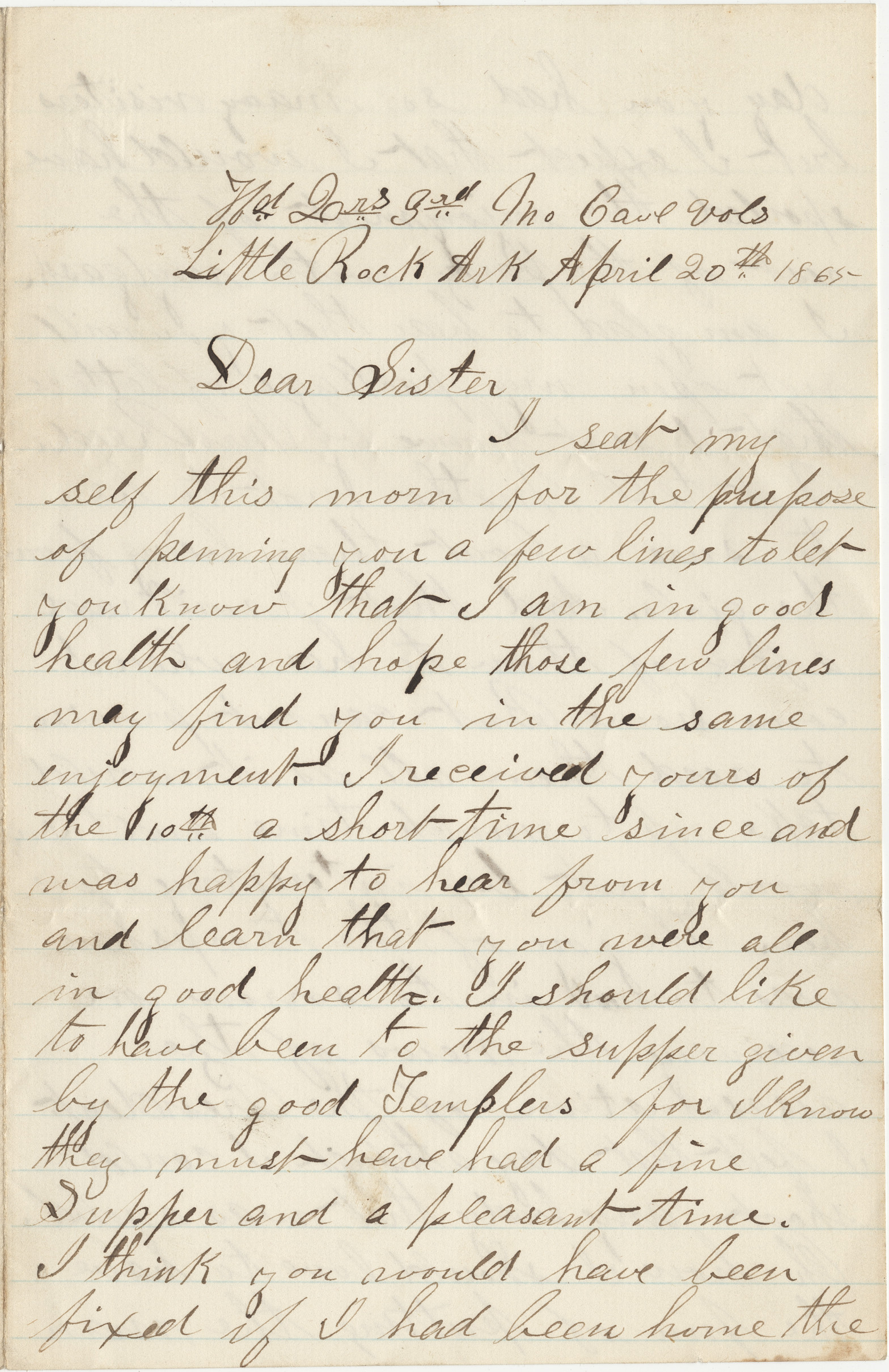
-
Description
A letter from William H. Kesler to his sister Rose Ann Kesler in late April 1865. He writes to her about hearing of the assassination, his sorrow and anger toward the assassin. At the beginning of the Civil War, William H. Kesler resided in Champaign, Illinois but joined the Missouri volunteer units after the quota was reached in his home state. He served in the 3rd Missouri Calvary from January 1862 - June 1865. He joined Company D, which was captained by John H. Reed and composed of men from both Missouri and Illinois. As part of a Union cavalry brigade, the 3rd Missouri Cavalry marched into Arkansas in August 1863, and was part of the force which captured the state capital at Little Rock on September 10th of that year. He spent much of the rest of the war in the Little Rock area and returned home in June of 1865.
-
Source
The State Historical Society of Missouri
-
Rights
This item is in the public domain and may be reproduced and used for any purpose, including research, teaching, private study, publication, broadcast or commercial use, with proper citation and attribution.
-
Creator
William H. Kesler
-
Publisher
The State Historical Society of Missouri
-
Date
April 20, 1865
from Apr. 28, 1865
Lincoln Assassination, April 28th, 1865
-
Full Title
El Nuevo Mundo: Lincoln Assassination, April 28th, 1865
-
Description
El Nuevo Mundo [The New World], was a Spanish tri-weekly newspaper dedicated to the interest of Republicanism in the Americas; copies were circulated throughout California, Mexico, Central America, and South America. In this issue, the newspaper included an illustration and an account from an eyewitness of the assassination of Lincoln in the Ford Theatre. Taking place two weeks after the assassination, El Nuevo Mundo reporters attended a Mexican Patriotic Club meeting in Virginia, Nevada. The President of the club gave a speech, expressing a thirst for justice and the fall of the Confederacy. The Society of Patriotic Women of Virginia City was also in attendance at the meeting in junction with the men of the Mexican Patriotic Club, whose president also gave a speech in front of the entire body. In a slightly altered manner, she spoke of not merely a hopeful defeat of the Confederates, but of return to union.
-
Transcription
“The Lady Harris, who was in the box with the president, gives the following account: The assassin entered in the box, and Major Rathburn [Henry Rathbone] got up and asked the intruder what business had him there. Without answering he ran inside, and placed the gun to the head of the president, fired, and in that instant he jumped onto the balustrade of the box and made a threatening motion with a dagger he carried, pointed at the face or chest of Mr. Lincoln… Major Rathburn [Rathbone] jumped forward to protect the president, grabbed the assassin by the end of his frock and was stabbed in the arm. The assassin then jumped onto the stage and fled – Dispatch of the associated press”
-
Source
Newsbank
-
Rights
Use of this item for research, teaching, and private study is permitted with proper citation and attribution. Reproduction of this item for publication, broadcast, or commercial use requires written permission.
-
Tags
-
Cite this Item
El Nuevo Mundo. "El Nuevo Mundo: Lincoln Assassination, April 28th, 1865 ". El Nuevo Mundo. Remembering Lincoln. Web. Accessed May 5, 2025. https://rememberinglincoln.fords.org/node/1090
from Apr. 28, 1865
El Nuevo Mundo: Lincoln Assassination, April 28th, 1865
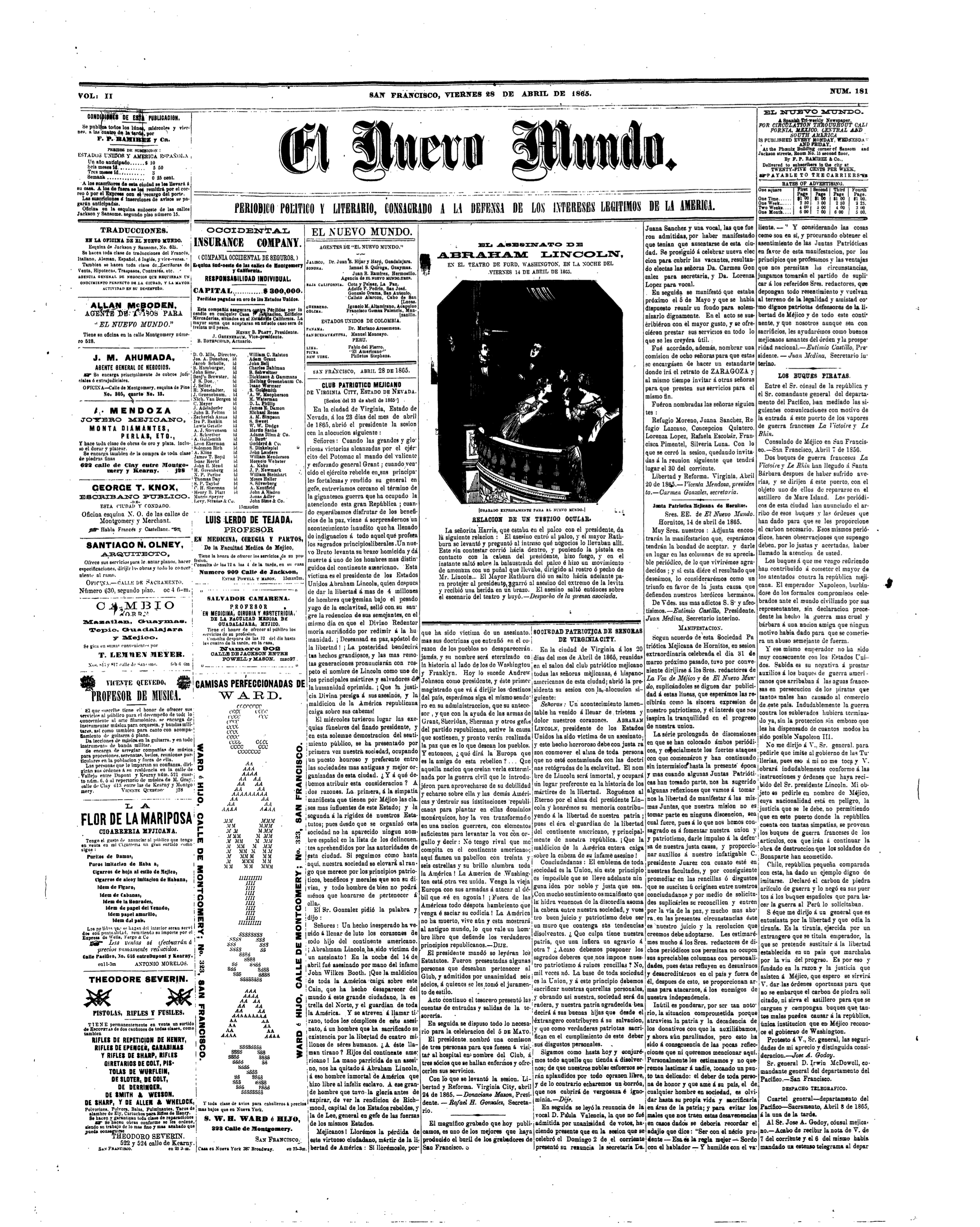
-
Description
El Nuevo Mundo [The New World], was a Spanish tri-weekly newspaper dedicated to the interest of Republicanism in the Americas; copies were circulated throughout California, Mexico, Central America, and South America. In this issue, the newspaper included an illustration and an account from an eyewitness of the assassination of Lincoln in the Ford Theatre. Taking place two weeks after the assassination, El Nuevo Mundo reporters attended a Mexican Patriotic Club meeting in Virginia, Nevada. The President of the club gave a speech, expressing a thirst for justice and the fall of the Confederacy. The Society of Patriotic Women of Virginia City was also in attendance at the meeting in junction with the men of the Mexican Patriotic Club, whose president also gave a speech in front of the entire body. In a slightly altered manner, she spoke of not merely a hopeful defeat of the Confederates, but of return to union.
-
Source
Newsbank
-
Rights
Use of this item for research, teaching, and private study is permitted with proper citation and attribution. Reproduction of this item for publication, broadcast, or commercial use requires written permission.
-
Creator
El Nuevo Mundo
-
Publisher
El Nuevo Mundo
-
Date
April 28, 1865
-
Material
newspaper
from Apr. 15, 1865
Letter to Mother
-
Full Title
Letter from John T. Ford to his Mother
-
Description
John T. Ford, owner of Ford's Theatre, wrote a letter to his mother, in Richmond, Va., the day of President Abraham Lincoln's death, apparently unaware of the news that the president had been murdered in his theatre. Ford expresses gratitude for his wife's health and the growth of his children. Coincidentally, he states that his daughter's birthday is April 15, and that his birthday is April 16. After hearing of the assassination, Ford took a train to Baltimore and was then arrested, questioned about the attack and imprisoned for a month. Ford denied any involvement in the conspiracy despite the fact that he had been a friend of John Wilkes Booth. Ownership of the theatre returned to Ford after the investigation and he attempted to reopen for performances. Many threatened to burn the theatre down and Ford eventually sold the building to the federal government. He continued to own and operate theatres in Maryland, Pennsylvania, South Carolina and Virginia.
-
Transcription
Dear Mother
I came to Richmond
hoping to see you and Frances - I
was glad to learn that she had
gone to Baltimore - I go home
Monday morning
I left all well, Edith has been in
bad health for nearly one year
but she is now quite well.
We have our six children, Annie
is taller than her mother - Charlie
is a very bright handsome boy nearly
13 years old. He is studying hard
and a fine scholar. George is
my [?] he is next to Charlie and
a dear good boy. Lizzie and Fannie
are two of the prettiest and sweetest
little girls in Baltimore.
John Lee is the youngest. He
is Martha's boy. He [masters?] her
everyway, and she has spoiled
him completely. She says Johnnie
is the prettiest
Martha is well and happy only
like Edith anxious about
you. They send their love
to all. Lucy-Jane, [?]
their brother and all
I Send you twenty dollars for
yourself and twenty dollars for
Jane as I fear she wants it. Send
it to her
Mrs. Stark has kindly promised to
send this. When I write again
I will direct to her care
Let me hear from you soon direct
to the enclosed direction - use
the envelope withing this letter and
have it put in the Richmond Postoffice
with the love of all, I am
affectionately yours
J. T. Ford
Richmond Va April 15th 1865
Today is Saturday Annie's birthday fifteen
years old. Tomorrow I am 36. -
Source
Box 4, John Thompson Ford Papers, Manuscript Division, Library of Congress, Washington, D.C.
-
Rights
This item is in the public domain and may be reproduced and used for any purpose, including research, teaching, private study, publication, broadcast or commercial use, with proper citation and attribution.
-
Tags
-
Cite this Item
John T. Ford. "Letter from John T. Ford to his Mother". Remembering Lincoln. Web. Accessed May 5, 2025. https://rememberinglincoln.fords.org/node/1078
-
Creator
John T. Ford
-
Date
April 15, 1865
from Apr. 15, 1865
Letter from John T. Ford to his Mother
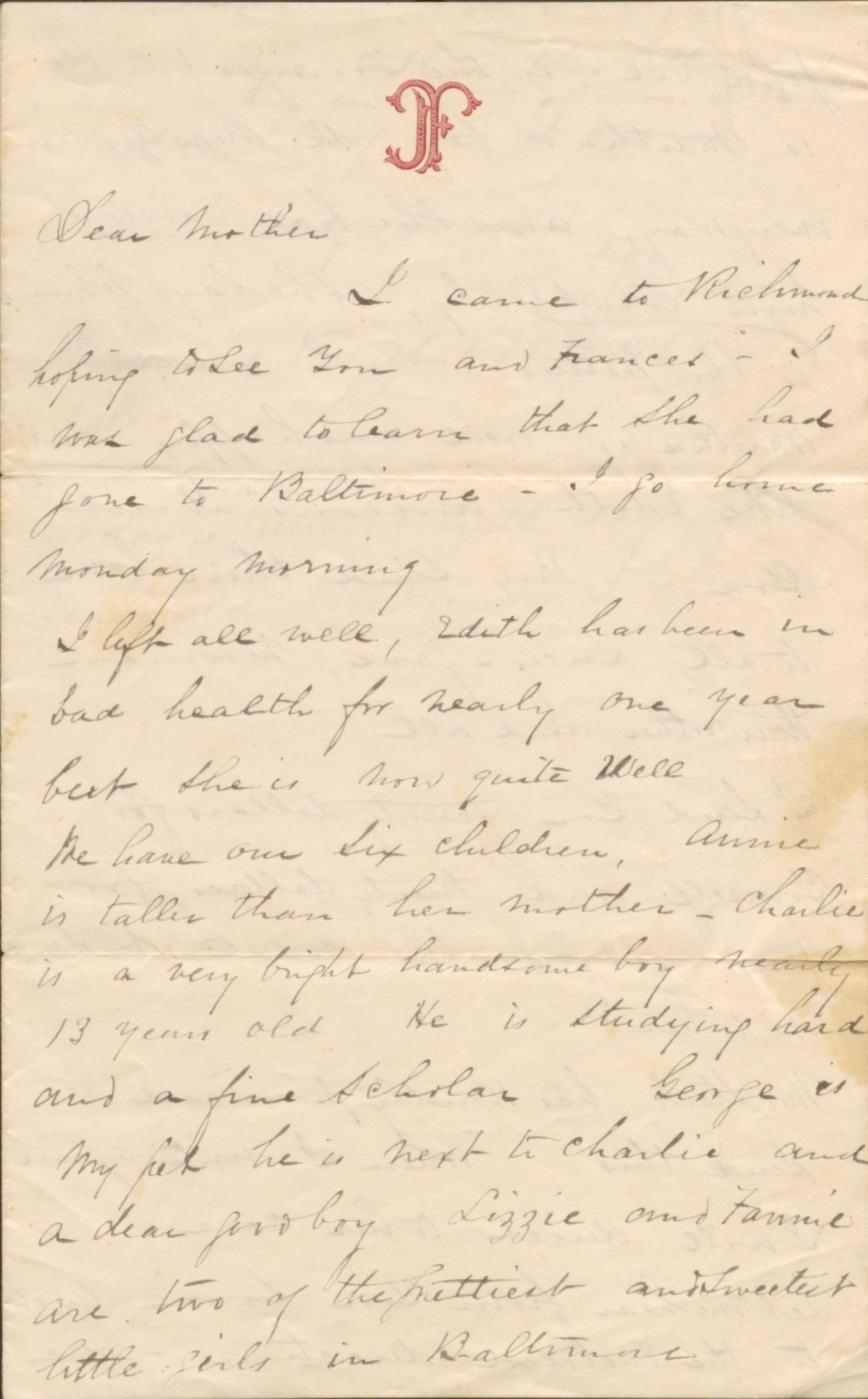
-
Description
John T. Ford, owner of Ford's Theatre, wrote a letter to his mother, in Richmond, Va., the day of President Abraham Lincoln's death, apparently unaware of the news that the president had been murdered in his theatre. Ford expresses gratitude for his wife's health and the growth of his children. Coincidentally, he states that his daughter's birthday is April 15, and that his birthday is April 16. After hearing of the assassination, Ford took a train to Baltimore and was then arrested, questioned about the attack and imprisoned for a month. Ford denied any involvement in the conspiracy despite the fact that he had been a friend of John Wilkes Booth. Ownership of the theatre returned to Ford after the investigation and he attempted to reopen for performances. Many threatened to burn the theatre down and Ford eventually sold the building to the federal government. He continued to own and operate theatres in Maryland, Pennsylvania, South Carolina and Virginia.
-
Source
Box 4, John Thompson Ford Papers, Manuscript Division, Library of Congress, Washington, D.C.
-
Rights
This item is in the public domain and may be reproduced and used for any purpose, including research, teaching, private study, publication, broadcast or commercial use, with proper citation and attribution.
-
Creator
John T. Ford
-
Date
April 15, 1865
from May. 1, 1865
Lincoln, in memorium
-
Full Title
Lincoln, in memorium
-
Description
Chorus for four mixed voices and piano accompaniment. Lyrics dedicated to "Col. Theo. S. Chase. Qr. M. Genl. of Mo. [Quartermaster General of Missouri]." The work opens with a short introduction in the style of a funeral march, followed by a two verses and a refrain. The verse is sung in unison or by a soloist and the refrain is in four vocal parts.
-
Transcription
Verse
Rest chieftain rest, now Columbia is free,
Rest for thy labors are o'er...;
Rest in the silence freemen hath made thee,
Rest on thy own native shore... .
Rest as thy glory floats over the sea,
Rest for thy work is well done;
Rest where archangels wait to receive thee,
Rest on the soil that thou hast won.
Chorus
Breathe a sad requiem ye millions now free,
Saviour of Freedom is waiting for thee.
Breathe a sad requiem ye millions now free,
Saviour of Freedom is waiting for thee.
Verse
Rest noble chieftain, our nation is free,
Rest on Columbia's proud shore.,
Rest while freemen will ever deplore thee
Rest with the brave, now no more...
Rest chieftain rest, soon heaven will wake thee,
Rest where our banner shall wave
Rest where in grace thy shadow reveals thee,
Rest in the land of the brave. [Chorus] -
Source
-
Rights
Public Domain. Suggested credit line: Civil War Sheet Music Collection, Library of Congress, Music Division.
-
Tags
-
Cite this Item
Woolcott, Francis (composer); Fox, Wm. P. (lyricist). "Lincoln, in memorium". Cincinnati: John Church, Jr., 1865. Remembering Lincoln. Web. Accessed May 5, 2025. https://rememberinglincoln.fords.org/node/1025
from May. 1, 1865
Lincoln, in memorium

-
Description
Chorus for four mixed voices and piano accompaniment. Lyrics dedicated to "Col. Theo. S. Chase. Qr. M. Genl. of Mo. [Quartermaster General of Missouri]." The work opens with a short introduction in the style of a funeral march, followed by a two verses and a refrain. The verse is sung in unison or by a soloist and the refrain is in four vocal parts.
-
Source
-
Rights
Public Domain. Suggested credit line: Civil War Sheet Music Collection, Library of Congress, Music Division.
-
Creator
Woolcott, Francis (composer); Fox, Wm. P. (lyricist)
-
Publisher
Cincinnati: John Church, Jr., 1865
-
Date
May 1, 1865
-
Material
Sheet Music

